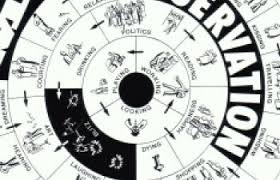 Mass Observation Day
Mass Observation Day
One day a year, there’s a call for people in Britain to send their anonymous diary accounts of their day http://www.massobs.org.uk/write-for-us/12th-may. After over a year of living through a global pandemic, this year’s contributions will be very telling.
If people also send them to today@bbc.co.uk, extracts may get read out on Thursday 13 May on Radio 4.
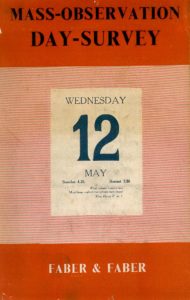 Mass Observation is a UK social research project, started in 1937 by three former Cambridge students – anthropologist, Tom Harrisson, poet Charles Madge and filmmaker Humphrey Jennings. Their first published report, “May the Twelfth: Mass-Observation Day-Surveys 1937 by over two hundred observers” was published in book form. The project ran until the mid-60s and was then revived in 1981 at the University of Sussex.
Mass Observation is a UK social research project, started in 1937 by three former Cambridge students – anthropologist, Tom Harrisson, poet Charles Madge and filmmaker Humphrey Jennings. Their first published report, “May the Twelfth: Mass-Observation Day-Surveys 1937 by over two hundred observers” was published in book form. The project ran until the mid-60s and was then revived in 1981 at the University of Sussex.
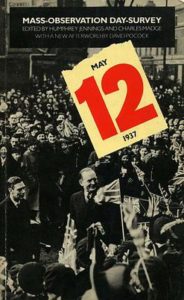 Formed in the aftermath of the abdication crisis of Edward VIII, Mass Observation sought to bridge the gap between how the media represented public opinion and what ordinary people actually felt and thought. This was done by taking the then-novel step of asking them. They aimed to create an “anthropology of ourselves,” combining professional fieldwork with diaries and questionnaires submitted by volunteers. For the next thirteen years, Mass Observation recorded the experience of the British public over the course of World War II and its aftermath.
Formed in the aftermath of the abdication crisis of Edward VIII, Mass Observation sought to bridge the gap between how the media represented public opinion and what ordinary people actually felt and thought. This was done by taking the then-novel step of asking them. They aimed to create an “anthropology of ourselves,” combining professional fieldwork with diaries and questionnaires submitted by volunteers. For the next thirteen years, Mass Observation recorded the experience of the British public over the course of World War II and its aftermath.
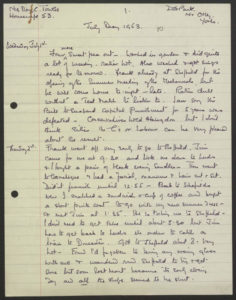 It originally aimed to record everyday life in Britain through a panel of around 500 untrained volunteer observers who either maintained diaries or replied to open-ended questionnaires (known as directives). They also paid investigators to anonymously record people’s conversation and behaviour at work, on the street and at various public occasions including public meetings and sporting and religious events.
It originally aimed to record everyday life in Britain through a panel of around 500 untrained volunteer observers who either maintained diaries or replied to open-ended questionnaires (known as directives). They also paid investigators to anonymously record people’s conversation and behaviour at work, on the street and at various public occasions including public meetings and sporting and religious events.
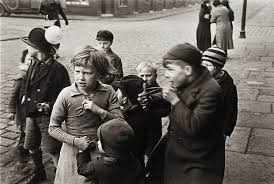 In August 1939 Mass-Observation invited members of the public to record and send them a day-to-day account of their lives in the form of a diary. No special instructions were given to these diarists so they vary greatly in their style, content and length. 480 people responded to this invitation and their diaries are now held in the Mass Observation Archive http://www.massobs.org.uk/
In August 1939 Mass-Observation invited members of the public to record and send them a day-to-day account of their lives in the form of a diary. No special instructions were given to these diarists so they vary greatly in their style, content and length. 480 people responded to this invitation and their diaries are now held in the Mass Observation Archive http://www.massobs.org.uk/
During WWII, Mass Observation research was occasionally influential in shaping British public policy. In 1939 Mass Observation publicly criticised the Ministry of Information’s posters, which led to their being replaced with more appropriate ones. In addition, their study of saving habits was used by John Maynard Keynes successfully to argue for tax policy changes.
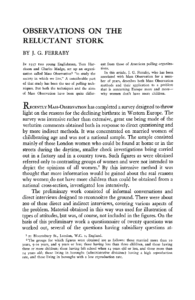
In some cases, researchers used Mass Observation methods to study particular issues. A 1945 paper by a researcher named J.G. Ferraby described an investigation into British families’ birthrates using surveys and interviews. The project sought accuracy in the face of stigmas that might deter respondents from telling the truth. For example, the researchers decided not to conduct interviews in small villages, where they believed people would be disinclined to speak frankly. In larger towns, Ferraby writes, “the same repression does not exist, as was demonstrated by the number of women who admitted to a totally strange interviewer that they got married because they had to.”
Following the war, and the departure of project founders Harrisson, Madge and Jennings, research began to focus on the commercial habits of the country, rather than the broader cultural research that characterised its first decade.
A re-evaluation of the Mass Observation archives led to a relaunch of the project in 1981. Today, housed at the Keep (a world-class centre for archives) at the University of Sussex, Mass Observation continues to collect the thoughts of its panel of writers through regular questionnaires (known as directives) and is used by students, academics, media researchers and the public for its unique collection of material on everyday life in Britain.

(As a former staff member of twenty five years’ standing at the University of Sussex and having spent many hours, even booking annual leave to do so(!), researching the history of the Victorian house in which I lived in Brighton for many years, I can personally testify to the cornucopia of cultural collections held in the Keep, their range of interesting talks and the ever-so helpful staff, Ed.).
The Mass Observation Archive at the Keep contains papers generated by the original Mass Observation social research organisation (1937 to early 1950s), and newer material collected continuously since 1981 (Mass Observation Project).
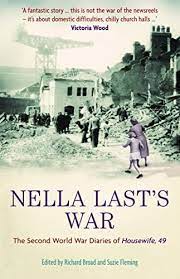
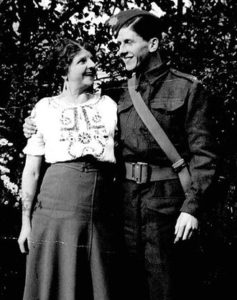
Nella Last was an English housewife who lived in Barrow-in-Furness, Lancashire. She wrote a diary for the Mass Observation Archive from 1939 until 1966, making it one of the most substantial diaries held by Mass Observation. Her diary, consisting of around 12 million words, is one of the longest in the English language. The wartime diaries were dramatised by Victoria Wood for ITV in 2006 as Housewife 49, which is how she headed her first entry at the age of 49. Wood played the lead role. Her younger son, Clifford (pictured above, with his mother) went on to be a famous sculptor.

Join the discussion
0 people are already talking about this, why not let us know what you think?